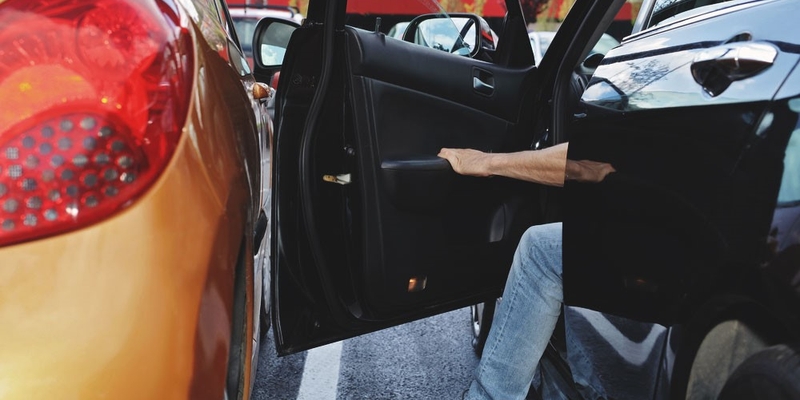
If you are not redirected within 30 seconds, please click here to continue.
Samedi: 10h – 16h HAE

If you are not redirected within 30 seconds, please click here to continue.
If you are not redirected within 30 seconds, please click here to continue.
Someone doors your car and flees. Is it a hit and run?

Table of Contents
Returning to your car in a parking lot after a visit to the mall to find someone’s dinged the side of your car with their door can be as deflating as a flat tire.
If you’re lucky, the person who doored you while parked in the next spot realized they damaged your vehicle and at least left their contact and insurance information. But if not, you’ve technically been the victim of a hit and run, albeit not a dramatic one. Still, how would your auto insurance respond in such a situation?
When hit-and-run rules apply
Regardless of the nature of the impact, if your vehicle is involved in a collision where the other driver flees the scene, it’s considered a hit and run.
From an insurance perspective, parking lot collisions are treated just like any other in that the same rules are applied to determine who caused the collision, although it’s pretty clear who’s responsible when your car is doored.
The trouble is: if that person is nowhere to be found, your insurance company can’t recoup any potential claim costs from the other driver’s company. This is why, with hit and runs, you will typically need to pay your deductible regardless of the fact that you’re not at fault.
Reporting a hit and run
Before reporting the incident, take note of any details you can remember about the car that was parked next to yours, including the make, model, and colour, as well as the licence plate number, even if only partially. If you can find any witnesses to the collision, be sure to get their contact information. You should also snap as many photos as possible to share with police and your insurance company. Capture details of the damage to your vehicle, including paint transferred from the other vehicle, and your car’s surroundings.
You should always contact police within 24 hours because a hit-and-run collision is a crime. The police will only show up, however, if the damage meets a certain threshold (in Ontario, it’s $2,000), so in this particular situation they may advise you to go to a nearby collision reporting centre instead.
Your next call should be to your insurance provider — be sure to have their emergency line handy. By providing as much detail about the collision as possible, your insurance company can begin the claims process quickly so you can get back on the road.
Check your collision coverage
A hit-and-run collision is generally covered by the collision section of your insurance policy, according to the Financial Services Regulatory Authority (FSRA). If you do have collision coverage, your claim will still be subject to the deductible you chose when you bought or updated that coverage.
Collision coverage is optional, which means if you chose not to get it, you’re on the hook for the repairs. The FSRA advises you to reach out to your agent, broker, or insurance company with specific questions about your policy, and says that you may be obligated to tell your insurance provider about incidents you have been involved in, even if you do not end up filing a claim.
Don't waste time calling around for auto insurance
Use RATESDOTCA to shop around, and compare multiple quotes at the same time.
Get money-saving tips in your inbox.
Stay on top of personal finance tips from our money experts!









